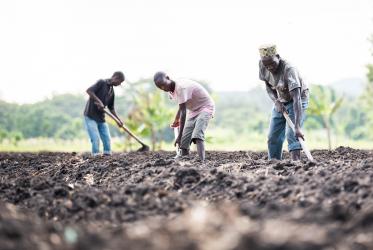By Kristine Greenaway
“What do we have the right to manipulate in creation?” The question is at the heart of a Canadian Quaker’s commitment to the process of encouraging member churches of the World Council of Churches (WCC) to reflect on scientific experiments in modifying life forms known as “synthetic biology”.
Faith groups need to be involved in discussions about the impact and possible limitations to scientific research that recreates existing life forms, says Anne Mitchell, a WCC Central Committee member and long-time advocate for socially responsible science. “We need to go in with our eyes wide open.”
Mitchell made her comments at the start of a conference in Toronto, Canada with a focus on exploring recent developments in biological engineering and the issues these raise for faith communities and civil society.
The conference, titled “Re-designing the Tree of Life: Synthetic Biology and the Future of Food,” was co-sponsored by the WCC Ecumenical Advocacy Alliance (EAA) and The Canadian Council of Churches (CCC). The event, which ran from November 2-4, featured international experts and advocates from Nigeria, Mexico, United Kingdom, United States of America, and Canada. The 43 participants included representatives of the Presbyterian Church in Canada, United Church of Canada, Evangelical Lutheran Church in Canada, Religious Society of Friends, Orthodox Church in America and Coptic Orthodox Church as well as other members of the Canadian Council of Churches, Canadian Conference of Catholic Bishops and the Christian Reformed Church.
The objective was to stimulate joint efforts to mobilize public demand for governments and international organizations, such as the UN Convention on Biological Diversity, to require responsible, accountable, and transparent scientific research and development.
Peter Noteboom, CCC’s acting general secretary, emphasized that the conference organisers and speakers are not “anti-science” but are learning together how to discern the promises and perils of genetic engineering 2.0 on a new scale of magnitude. He notes that on the one hand science promises benefits through the development of medications using synthetic biology engineering techniques. On the other hand, new products and production processes can have disruptive effects when they leave the laboratory. For example the development and release of new living modified organisms may have irreversible effects; or new corporate owners of intellectual property can displace producers located in indigenous communities and elsewhere who depend on local production for their traditional livelihoods.
WCC North American president Bishop Mark MacDonald, speaking during the opening session, told participants that he has deep reservations about how science and commodification of life forms are shaping human life. Faith groups, he says, are called to shape minds, imaginations and souls: “We need to resist spiritual formation by this culture of money.”
Presentations by guest speakers focussed on how science can now take existing life forms, such as plants, and re-engineer their genes in order to create modified life forms through processes grouped together under the term “synthetic biology.” Several speakers noted concerns that the impact of these newly engineered life forms on existing plants and on farm economy is not clear and needs further study.
Conference organisers say they met their objective of creating connections for common action to raise awareness about the need for scientific research in the field of synthetic biology to be subject to public review. Guest experts have agreed to provide information and research to support advocacy initiatives.
“The Food for Life campaign plans to share ongoing updates and information on the subject through webinars, and training programmes such as the Eco-school and those linked to theological colleges worldwide, and through newsletters,” says Andrew Kang Bartlett, from the Presbyterian Church USA, and a member of the WCC-EAA Strategy Group on Food. “We hope to take these discussions to the level of the congregations, to empower them to participate in the vital debates,” he added.







